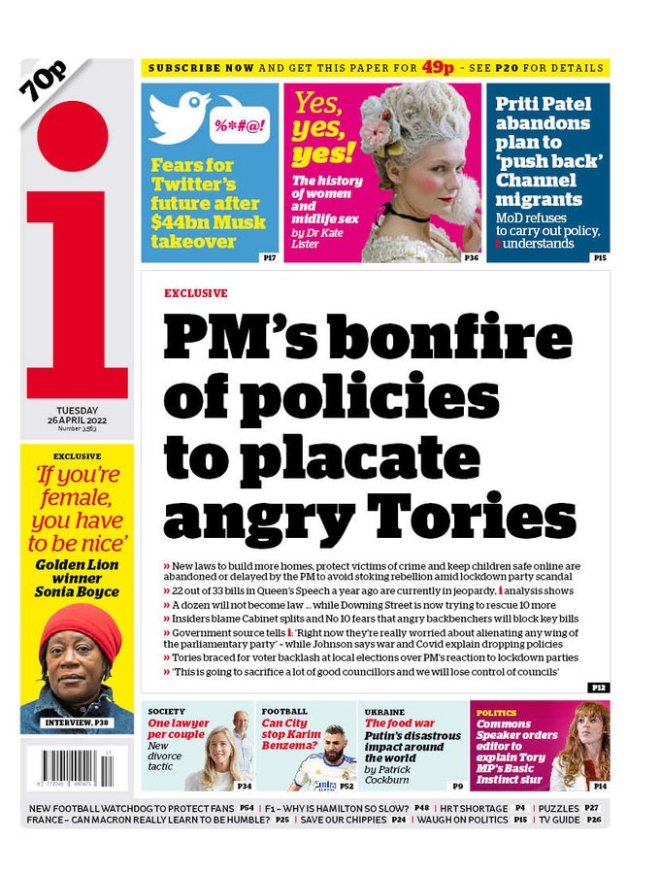20th May 2022
Sensible conservative-unionists – and, no, that is not necessarily a contradiction-in-terms – used to abide by the maxim that politics was ‘the art of the possible’.
And one thing that the European Union did was make certain things possible, which otherwise were not possible.
With Gibraltar and Spain, for example, the border issue became less of an issue.
And with the island of Ireland, the border issue too became less of an issue.
Because both Ireland and the United Kingdom were both members of the European Union – and thereby both members of the internal market and customs union – a hard border, with infrastructure and bureaucracy, was unnecessary.
This created the conditions that made the Good Friday Agreement possible – though, of course, there were many other factors.
But now Brexit has come along, there is a problem.
There has to be a border somewhere where one entity is inside a pan-European internal market and customs union and the other entity is not.
Had Brexit not been so extreme – with the United Kingdom staying inside the internal market and/or the customs union (which is the position with some other non-EU states) – then the Irish border issue would be less of a problem.
But the Brexit which Theresa May insisted on, with the United Kingdom outside the internal market and customs union, meant there was going to be a problem.
May eventually realised this – and so she supported the ill-fated ‘backstop’ arrangement, which meant that – if there was no post-Brexit trade agreement – the cross-border arrangements of European Union membership would continue as a default.
But May’s proposal was rejected heavily by the House of Commons (including by ‘remain’ Members of Parliament).
That left one other option – the border in the Irish Sea, which was supported by the new Prime Minister Boris Johnson, and enshrined (ahem) in the Northern Irish Protocol.
And, as this blog has set out many times, Johnson here changed the policy, negotiated the Protocol, signed the withdrawal agreement containing the Protocol, fought a general election so as to get a mandate for the Protocol, and rushed the relevant legislation through parliament.
Johnson could have not done more, as Prime Minister, to have brought the Protocol into existence and to pass it into law.
But.
The Protocol is a solution to one problem but not to another.
It is a solution to the political problem of late 2019 where Brexit needed to be ‘done’ – and the Protocol was the only possible way to do so avoiding a hard border on the island of Ireland.
But it is not a solution to the deeper problem of how Brexit is compatible with the on-going existence of the union that is the United Kingdom of Great Britain and Northern Ireland.
Either one has Brexit (at least without continuing membership of the internal market and the customs union) or one has that union, but one cannot easily have both.
This is not to say that a united Ireland is likely – there are many solutions to political problems that never are adopted.
It may be that the problem continues, and continues, and is never resolved.
But a united Ireland is the only ultimate solution to there not being a border somewhere in respect of the north of Ireland.
Of course, special arrangements would need to be made for the non-nationalists in Northern Ireland – and one would hope that those protections serve that community better than the (lack of) protections for the nationalists in the north of Ireland after 1922.
Having watched Brexit from the beginning, I am still bewildered why supposed unionists did not see this problem coming – and indeed strongly campaigned for Brexit.
The European Union provided a means by which Northern Ireland could have continued in the United Kingdom, regardless of demographic changes and the gradual fall in unionist support.
But some forgot that politics was the art of the possible, and they pursued the politics of the impossible instead.
**
Thank you for reading – and please support this independent law and policy blog so that it can continue.
So for more posts like this – both for the benefit of you and for the benefit of others – please support through the Paypal box above, or become a Patreon subscriber.
You can also become an email subscriber.
***
Comments Policy
This blog enjoys a high standard of comments, many of which are better and more interesting than the posts.
Comments are welcome, but they are pre-moderated and comments will not be published if irksome.
For more on this blog’s Comments Policy see this page.




